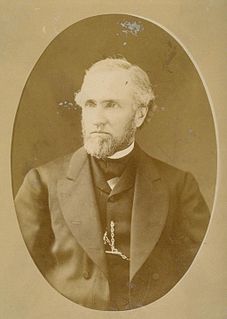
The University of California (UC) is a public land-grant research university system in the U.S. state of California. The system is composed of the campuses at Berkeley, Davis, Irvine, Los Angeles, Merced, Riverside, San Diego, San Francisco, Santa Barbara, and Santa Cruz, along with numerous research centers and academic abroad centers. The system is the state's land-grant university.

Clark Kerr was an American professor of economics and academic administrator. He was the first chancellor of the University of California, Berkeley, and twelfth president of the University of California.

The Regents of the University of California is the governing board of the University of California (UC), a state university system in the U.S. state of California. The Board of Regents has 26 voting members, the majority of whom are appointed by the Governor of California to serve 12-year terms.

The University of California, Hastings College of the Law, is a public law school in San Francisco, California. Founded in 1878 by Serranus Clinton Hastings, UC Hastings was the first law school of the University of California as well as one of the first law schools established in California and the Western United States. Although part of the University of California, UC Hastings is not directly governed by the Regents of the University of California. UC Hastings is also one of the few prominent university-affiliated law schools in the United States that does not share a campus with the university's undergraduates or other postgraduate programs.

Henry Huntly Haight was an American lawyer and politician. He was elected the tenth governor of California from December 5, 1867, to December 8, 1871.

John Morton Eshleman was an American lawyer and politician from California. He was Lieutenant Governor of California from 1915 to 1916.

The Bancroft Library in the center of the campus of the University of California, Berkeley, is the university's primary special-collections library. It was acquired from its founder, Hubert Howe Bancroft, in 1905, with the proviso that it retain the name Bancroft Library in perpetuity. The collection at that time consisted of 50,000 volumes of materials on the history of California and the North American West. It is the largest such collection in the world. The building the library is located in, the Doe Annex, was completed in 1950.
Robert Gordon Sproul was the first system-wide President (1952-1958) of the University of California system, and the last President (11th) of the University of California, Berkeley, serving from 1930 to 1952.

Robert Walker Kenny, 21st Attorney General of California (1943-1947), was "a colorful figure in state politics for many years" who in 1946 ran unsuccessfully against Earl Warren for state governor. In 1947, he led the defense of the Hollywood Ten.

The campus of the University of California, Berkeley and its surrounding community are home to a number of notable buildings by early 20th-century campus architect John Galen Howard, his peer Bernard Maybeck, and their colleague Julia Morgan. Later buildings were designed by architects such as Charles Willard Moore and Joseph Esherick.
The history of the University of California, Berkeley begins on October 13, 1849, with the adoption of the Constitution of California, which provided for the creation of a public university. On Charter Day, March 23, 1868, the signing of the Organic Act established the University of California, with the new institution inheriting the land and facilities of the private College of California and the federal funding eligibility of a public agricultural, mining, and mechanical arts college.
The San Francisco Examiner is a newspaper distributed in and around San Francisco, California, and published since 1863.
John Harmon Charles Bonté (1831–1896) was a lawyer, Episcopal priest, and Secretary of the Board of Regents of the University of California from 1881-1896. He also held the offices of Land Agent, Superintendent of Buildings and Grounds, and Secretary of the Academic Senate. He was Professor of Legal Ethics at the University's affiliate, Hastings College of the Law. He worked tirelessly for the independence and advancement of the University for 15 crucial years in its early development.
William Kraemer Coblentz [KAHB-lenz] was an American attorney and behind-the-scenes power broker who played an important role in California politics in the years after World War II, serving as a Regent of the University of California and legal representative for the rock bands Jefferson Airplane and the Grateful Dead, as well as for socialite, kidnapping victim and convicted bank robber Patty Hearst.

Occupy Cal included a series of demonstrations that began on November 9, 2011, on the University of California, Berkeley campus in Berkeley, California. It was allied with the Occupy Wall Street movement in New York City, San Francisco Bay Area Occupy groups such as Occupy Oakland, Occupy Berkeley, and Occupy San Francisco, and other public California universities. "Cal" in the name "Occupy Cal" is the nickname of the Berkeley campus and generally refers specifically to UC Berkeley.

The Free Speech Movement (FSM) was a massive, long-lasting student protest which took place during the 1964–65 academic year on the campus of the University of California, Berkeley. The Movement was informally under the central leadership of Berkeley graduate student Mario Savio. Other student leaders include Jack Weinberg, Michael Rossman, George Barton, Brian Turner, Bettina Aptheker, Steve Weissman, Michael Teal, Art Goldberg, Jackie Goldberg and others.

Edward Tompkins (1815–1872) was an American lawyer. He is best known for endowing a chair at the University of California where he had been elected to the board of regents.

Oscar Lovell Shafter was an American attorney and Associate Justice of the Supreme Court of California from January 2, 1864, to December 11, 1867.
Warren Olney Jr. was an American lawyer who served as an Associate Justice of the Supreme Court of California from March 1, 1919, to July 1921.

Claire Giannini Hoffman was the first woman to serve on the boards of Bank of America and Sears, Roebuck & Company. She also was the only woman guest invited at international bank conference events for some two decades.













